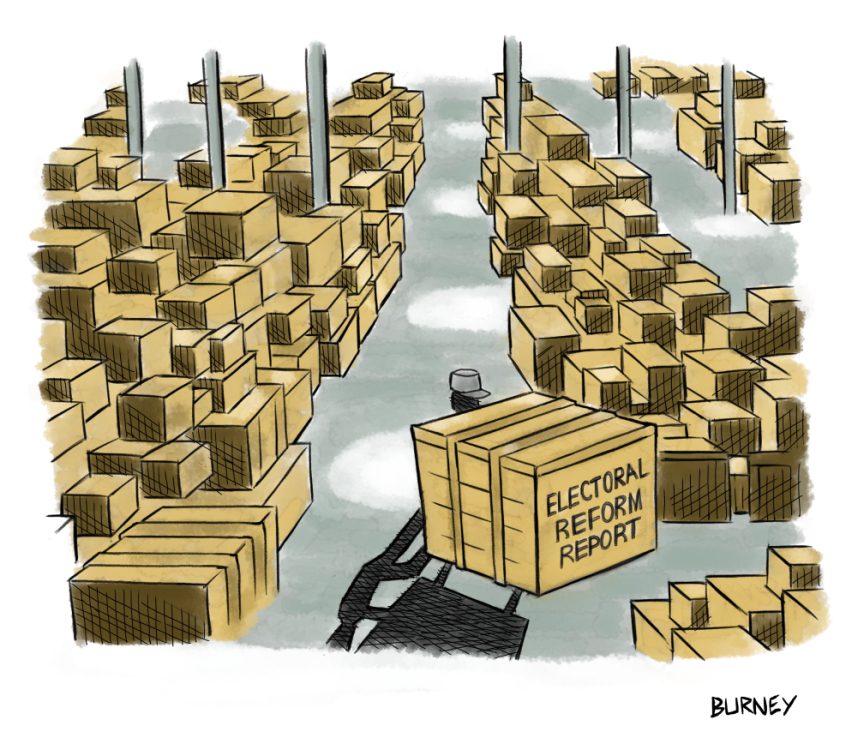While Maryam Monsef apologised several times for her Question Period comments saying that the electoral reform committee didn't do their job, I will contend that she was, in fact, right. When you actually look at the options presented by the committee, and in particular the NDP and Green members in their "supplemental report," what was on offer were not in fact any "viable alternate voting systems to replace the first-past-the-post system."
The key takeaway, if you listen to the NDP, was a proportional system. If you listen to the Conservatives, it was the call for a referendum. But looking a little closer at the proportional representation recommendations, it was with the caveat that there was no appetite for party lists to fill the proportional "top-up" seats, and that the proportionality of whatever system gets chosen meets a low score on the Gallagher Index, which is a measure of the so-called "distortion" between the popular vote share and the number of seats awarded. This creates a problem for the government because of the limited options that they are left with, and they are not great ones to consider. For example, single transferable voting has elements of proportionality built-into the multi-member ridings that would be used, but in a country as vast and sparsely populated as Canada, multi-member ridings are only practical in the cities. We already have single-member rural and remote ridings larger than France, and trying to make these ridings multi-member ones would create ridings so massive as to be unwieldy.
The NDP and the Greens came up with proposals that they felt met the criteria of both proportionality and not using lists, which were a mixed-member proportional system with an ever-increasing number of top-up seats added with each election cycle to continue to get toward that lower Gallagher Index number; the other is what is called a "rural-urban proportional" system, and each would use what is known as the "Baden-Württemberg" model for filling the proportional seats. First of all, rural-urban proportional is almost certainly going to be a non-starter because it essentially creates two separate voting systems multi-member ridings in the cities and single-member ridings in the countries with top-up seats, but good luck convincing the Supreme Court of Canada that having separate systems is constitutional. And as for this "Baden-Württemberg" model, it is based on the system used in the German state for which it is named where they don't use lists to fill proportional seats, but rather the "best runners up" in the region, so that those local candidates who didn't actually manage to get elected can still, well, get elected in order to fill out the proportional top-up seats.
This is untenable in the extreme.
Elections are not just about deciding who gets to fill seats in the upcoming parliament, it also is about deciding to reward or punish incumbents who already fill those seats, so that if that incumbent hasn't done a good job, they can be voted out and replaced with someone else. It's one of the most fundamental aspects of accountability in our electoral system. But with this "best runner up" model, it means that even if a riding wanted to vote someone out for poor performance, they can still get back into parliament because they require someone to fill that top-up seat and he or she is still getting some votes. In other words, this system makes it virtually impossible to punish or vote out bad MPs. The accountability function of elections is virtually obliterated as a result. Worse yet, this becomes a codified system of participation medals in politics you can still get a seat even if you lose the election, just for participating. How is this any way to run a democracy?
This inability to hold governments to account is another effect of proportional systems writ-large, which just becomes magnified under these proposals. We've seen in PR countries like Germany that one party can be at the centre of coalition governments for decades and never leave power. Rather, they simply shuffle their coalition partners around after elections, and continue to govern. This is not accountability and yet, here in Canada, Elizabeth May has been on record as saying that she would prefer a system where you cannot easily toss a government so that someone else can implement their own policy agenda. Do we really want a system where it becomes impossible to "throw the bums out"? Where holding governments to account becomes a nigh-impossible task? And by adding in the "best runner up" model, we would have a system where you can't vote out MPs and you can't vote out governments. What then becomes the point?
The fixation on proportionality is becoming toxic to our system of government. Proportionality for the sake of proportionality undermines some of the most basic tenets of Westminster democracy, both in terms of the meaning of the vote, to the agency of an MP, to the ability to hold MPs and governments to account. In giving credence to the logical fallacy that the popular vote figure is a real thing (it's not elections are 338 separate events, not a single one), and letting sore losers whinge and cry about being treated "unfairly" because they weren't able to engage enough Canadians to win more seats, we have managed to completely distort the meaning of our system in the popular consciousness. Lines like "why should someone with 40 percent of the votes get 100 percent of the power" completely misread and malign how parliament works, and has fuelled this sense of discontent with the system and given accusations of brokenness where none actually exists.
Ultimately this is why the committee's report fails. It has bought into these false notions about how our system operates and presented options to replace it that we cannot in good conscience stomach. Monsef should articulate this basic truth rather than walk on eggshells around the sensitivities of the opposition parties. Sadly, I doubt she ever will.








